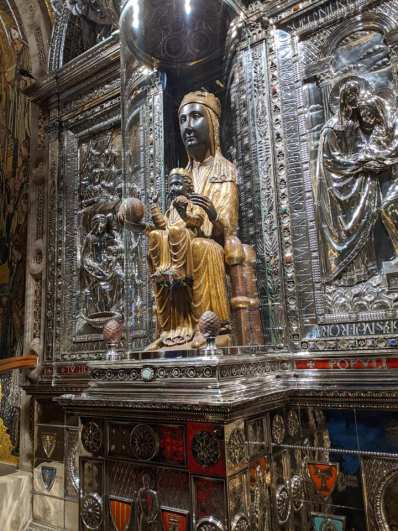
For years, I have been fascinated with the Black Madonna. There are hundreds of images of black Virgins all over the world. The one I know best is Our Lady of Czestochowa in Poland, the homeland of my ancestors. There is a shrine to her there, and also near my home in Pennsylvania. I have read about these Madonnas in Ean Begg’s The Cult of the Black Virgin. Begg describes them as vestiges of goddess worship, pagan images that were taken over by the Church in ancient times.
And so when my husband and I traveled to Barcelona last month, the Madonna at Montserrat Abbey was on my list of must dos. Our tour guide told us her face and hands were black from soot caused by years of lighted candles, and that after trying and failing to “clean her up” the monks decided to just paint her black. The Matka Boska Czestochowa was also explained to me that way – too many candles, too much soot. She plays a role in my forthcoming novel, Where the Stork Flies, directing and guiding the characters behind the scenes.
Why is it so hard to accept the idea of a black woman as Madonna? Many stories have been written of black goddesses who became figures of the Virgin Mary to ease the “conversion” of people from their pagan practices to the Catholic faith. It’s very likely the same reason Christmas coincides with the winter solstice, though we have no proof of Christ’s actual birth date on December 25th.
Change is hard for people, and always has been. One of the reasons we love our holiday traditions is because they remind us of good times past and tie us to people we loved who shared them with us. We decide that the way it was is the way it should always be. What our elders taught us must be true. But what if what they were taught, and passed on to us, has a little more nuance? Wouldn’t it open our hearts and minds to let in some other interpretations? Does it make sense that the robes of the many black Madonnas were not darkened by candle soot, only her skin?
It’s a custom to touch the Montserrat Virgin’s hand and ask for a favor. Though she is behind glass now, her hand is exposed for the thousands of people who touch it every year. I made a wish too, but for someone else. I have pretty much everything I need.
What’s your story? Have you ever questioned something you were taught? Share in the comments and I’ll put your name in the drawing for a copy of Sold on a Monday, by Kristina McMorris, the story of a 1930’s newspaperman whose attempt to help poor children causes unintended consequences.
The winner of last month’s drawing is Emily Labows. She wins a copy of The Heirs by Fran Hawthorne. Thanks for adding to the discussion, Emily!